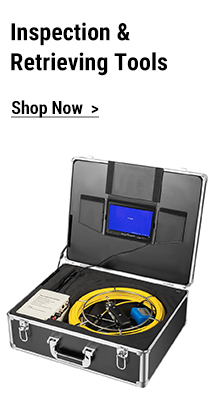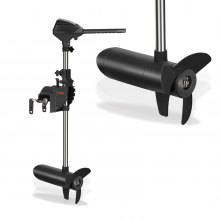VEVOR's Electric Trolling Motors: Paving the Way for Precision Angling
A trolling motor is a compact electric engine usually mounted on a fishing boat's bow or stern. Its purpose is to silently move the ship through the water, not to disturb the fish.
As the conductor of a new age in aquatic pursuit, VEVOR smoothly ushers in a fishing world where every throw is a dance between talent and strategy. Imagine a world in which your boat glides with the ease and precision of an angler's fantasy, all because of the state-of-the-art technology of electric trolling motors.
What Size Trolling Motor Do I Need?
"Pounds of thrust," merely a static assessment of the pulling or pushing strength, is used to rate electric motors. The power ratings of modern electric motors range from roughly 30 to over 100 pounds of force.
What is the required amount of thrust or trolling power? Your boat's weight and size will determine the thrust needs. The motor's thrust rating also determines the battery power needed to run the engine.
The electric motor is powered by deep-cycle 12-volt marine batteries, which explains why the power rating is expressed in 12-volt steps.
The most powerful 36-volt motors need three 12-volt batteries, whereas the least powerful motors need one 12-volt battery. Naturally, more batteries take up room and add much weight to the boat.
To fit the trolling motor usually installed in the boat, most new boats have been built with battery storage. If you are considering upgrading your boat's power or adding a trolling motor, be sure the ship has enough space for the necessary batteries.
There are various techniques to regulate electric trolling motors:
Hand-control motors
These resemble conventional gas-powered trollers quite a bit. Models with tiller handles are simple, but you must stand close to them.
Foot-control motors
You may regulate the steering and power level with your foot. While some have an electric steering system, others are mechanical. Models with foot control can allow steering from the ease of your seat.
Wireless model motors
You can control the motor from any part of the boat with a hand controller. Whatever you do, keep the remote out of the water. It's going to be one miserable fishing day.
Luckily, they include lanyards that you can wear around your neck. The fact that wireless controls might be tricky for novice users is one of their drawbacks.
Electric Trolling Motor Features
The electric trolling motor is a quiet powerhouse in the fishing world, transforming our ability to navigate rivers for the best fishing experience. The features built into these motors change along with technology.
Whisper-Silent Function
Since they run quietly, electric trolling motors are highly praised for enabling fishermen to navigate covertly without upsetting the calm seas. To provide an even quieter experience and guarantee that your fishing adventure is uninterrupted, VEVOR motors go above and beyond this.
Digital Controls and Displays
VEVOR motors feature digital displays and controls that are straightforward to use, making setting changes quick and simple. Anglers' convenience on the lake is increased since they can easily monitor battery life, change speed, and access other vital information.
GPS and Navigation
Advanced navigation is possible with specific high-end trolling motors that have GPS capabilities. This enables users to use GPS coordinates to anchor in a specified area, maintain a course, and set waypoints.
Lift-Assist System
A lift-assist feature on specific bow-mounted trolling motors makes deploying and stowing the motor simpler. This is especially helpful in relieving strain on the fisherman and streamlining the preparation of the boat for fishing.
Mounting Style
There are several mounting options for trolling motors, including transom, bow, and engine mounting. Due to their popularity, bow-mounted motors allow for excellent boat handling and maneuverability.
Why Purchase VEVOR Electric Trolling Motors?
Selecting VEVOR Electric Trolling Motors guarantees a smooth and easy time in the water. VEVOR motors, renowned for their state-of-the-art engineering, combine strength and longevity.
The motors have adjustable speed settings that enable accuracy when trolling or navigating various seas. They sustain challenging maritime conditions thanks to materials that prevent corrosion.
VEVOR's lift-assist systems demonstrate their dedication to user ease by simplifying motor deployment. The integration of digital screens and battery meters ensures real-time monitoring. Incorporating GPS navigation, which gives users enhanced control, distinguishes VEVOR.
FAQs About Electric Trolling Motors
Are there safety features in electric trolling motors?
A common feature on trolling motors is an emergency cutoff switch that cuts the engine if the angler falls overboard. Digital screens for tracking battery levels are also included in certain models, guaranteeing a controlled and safe boating experience.
Can I use a trolling motor as the primary source of propulsion?
Especially for bigger boats, trolling motors are usually intended for something other than primary propulsion. They work well for maneuvering and trolling at slower speeds. Always review the specifications of your boat, and for larger boats, think about adding a primary engine.
What voltage trolling motor do I need?
The size of your vessel determines the proper voltage. Larger boats could need 24V or 36V motors, while smaller boats usually utilize 12V motors. In general, higher voltage motors provide greater power and extended battery life.
Can I use a trolling motor with a solar panel?
Indeed, specific trolling motors can be used with solar panels to provide sustainable and environmentally beneficial power sources. When installing solar panels, ensure they are compatible with the particular trolling motor and according to the manufacturer's instructions.






































